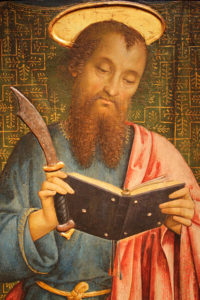 Festival of St. Bartholomew, Apostle
Festival of St. Bartholomew, Apostle
August 24
The Lord be with you
The name “Bartholomew,” as this disciple is referred to in Matthew, Mark, Luke, and the book of Acts, means “the son (bar) of Tolmai (tholomew).” In the Gospel of John we discover his personal name, Nathanael. He was one of the first of Jesus’ twelve disciples. His home was in the town of Cana, in Galilee (John 21:2), where Jesus’ performed His first miracle (John 2:1-11). He was invited to become one of the Twelve by Philip, who told him that they had found the Messiah in the person of Jesus of Nazareth (John 1:45). Bartholomew’s initial hesitation to believe, because of Jesus’ Nazareth background, was quickly replaced by a clear, unequivocal declaration of faith, “You are the Son of God! You are the King of Israel!” (John 1:49). He was present with the other disciples (John 21:1-13) when they were privileged to see and converse and eat with their risen Lord and Savior. According to most (but not all) Early Church Fathers, Bartholomew brought the Gospel to Armenia, where he was martyred by being flayed alive and beheaded in Albanus (modern Derbend) on the Caspian coast. Eusebius of Caesarea reports a tradition that says Bartholomew preached in India, and brought a copy of the Gospel of Matthew with him and left it there. This same Gospel was, according to this tradition, later found in the possession of one Pantaenus, a converted stoic philosopher, and brought to Alexandria. Other traditions record him as serving as a missionary in Ethiopia, Mesopotamia, Parthia, and Lycaonia. Pictorial depictions of him often include a flaying knife and the Gospel of Matthew.
August 24 has been St. Bartholomew’s day on calendars of the Western church since the eighth century, but the reason for the date is not known. The Eastern Orthodox Churches commemorate him with St. Barnabas on June 11. In European history St. Bartholomew’s Day is remembered for the massacre of Protestants that took place on this day in Paris in 1572.
The LC-MS does not assign special readings for “Commemorations,” but it does for Feasts/Festivals. The Festival of St. Bartholomew, being one of the latter, has assigned readings. They are Proverbs 3:1-8, 2 Corinthians 4:7-10, Luke 22:24-30, and John 1:43-51.
Prayer: Almighty God, Your Son, Jesus Christ, chose Bartholomew to be an apostle to preach the blessed Gospel. Grant that Your Church may love what he believed and preach what he taught, through Jesus Christ, our Lord, who lives and reigns with You and the Holy Spirit, one God, now and forever. Amen.
Other appropriate prayers:
• For the church in Armenia
• For grace and strength to recognize the Son of God
• For strength and guidance to find ways of serving Jesus
• For the gift of innocence and purity of heart
Blessings in Christ,
Pastor John Rickert
